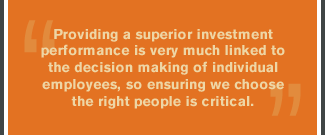Do you view the human resources function in your organization as a cost center or one that actually drives value for the business?
Keith Skeoch: Clearly, it is a value driver and value creator. However, I don't see it as HR but rather talent management. In an asset management firm, success rests on human capital and technology, and talent management/HR is absolutely critical for our most important assets. We outsource all of our commodities -- so that Gordon Teasdale, our HR director, and his team can focus on the strategic development of our human capital rather than working as a process-driven team.
On what do you base this opinion?
 |
Skeoch: If we are going to spend money and time on our valuable resource, i.e. our workforce, we want to make sure we can add value by developing that human capital. My job and Gordon's is to make sure we do that. Having a huge number of people processing the payroll doesn't add value, whereas ensuring that we have the best employees making the right decisions for us most certainly does.
Do you think HR should play a role in developing overall business strategy, or is its expertise best suited to implementing the people issues within strategy that is decided by other senior executives?
Skeoch: HR is embedded in all that we do. When we look at where we'd like to be in five years' time, we always identify our strategic priorities -- the operational deliverables that are the "must dos" to deliver those plans. Our key strategic priorities are shared across our four "pillars" -- investment performance, process (i.e. the process that delivers and administers that investment performance), people, and profit. Thus, the people aspects are fundamental to our business imperatives. Leadership and engagement are two things we have taken phenomenally seriously over recent years, as has building a strengths-based organization, and these are at the core of our overall strategy.
What do you think is the key contribution that HR makes to your business?
Skeoch: Ensuring the quality of our people and our ability to recruit, develop, and retain the best talent.
Culture is very important to us -- as much so as technical expertise -- so Gordon and his team have identified attributes that are required for successful Standard Life Investment employees. Within our recruitment processes we use the Gallup Q12 [employee engagement] interview, and then match the results of these interviews against our own criteria. Providing a superior investment performance is very much linked to the decision making of individual employees, so ensuring we choose the right people is critical.
In addition to the normal aspects of HR and talent management, our HR team is also very involved in internal communication and how that links with engagement. We have grown very rapidly over the last three years, and our personnel has expanded from 500 [to] 800 in that period, which brings new leadership challenges. Gordon and his team have been focused on rolling out a very interesting leadership program, which has included a whole week of leadership development training where we have had both internal and external speakers to stimulate debate, allow people to think through how the issues relate to themselves, and enable us to embed key messages concerning the vision of the company and our employees' part in it. As part of our full planning day -- which most organizations use to consider financial issues -- we set aside a quarter of that time to discuss our current leadership style and how we need to take this forward. So you can see that it is key to our strategy.
How do you measure the ROI of HR within your company?
Skeoch: We use a number of measures -- indirectly, I guess, on some of the things we do. However, we do have quite rigorous quantitative methods for assessing the quality of our people -- through investment performance and risk-adjusted performance both in terms of teams and individuals. We also have a corporate scorecard with a number of exacting measures in all of those categories. We monitor the quality of our talent pool by carrying out the Gallup Q12 twice a year, which is a key measurement for us. We also look at the results of our formal appraisal processes, and obviously factor in things such as employee turnover. There are some formal measures that tell us whether or not we are an upper quartile organization, which is what we want to be. Currently we are in that upper quartile compared to most firms and, due to the significant progress we have made, we are higher than any of the other Standard Life group companies.
Is your HR director on the board?
Skeoch: No, but he is a key member of our senior executive committee, which is the team [that] is responsible for running the business on a day-to-day basis. Gordon is in charge of the development and execution of our one-year-ahead operating plan, which forms part of our overall five-year business plan, so he is fully and actively involved at a senior level.
Can you see a time when that role would be represented at board level?
Skeoch: It's possible that in the future, if we have a bigger board, the HR director could join it. We're a 100% owned subsidiary, and the Board currently tends to act more as an oversight committee, focusing more on long-term strategy and governance issues in a much broader sense.
However, in terms of what we do every day, it would make no difference if Gordon was on the Board -- otherwise he would certainly be a Board member now. In terms of formulating what we do and what we are working towards, Gordon is right at the center of it all, planning it and making it all happen.
This article is adapted from one originally published in TheHRDirector. Reprinted with permission.